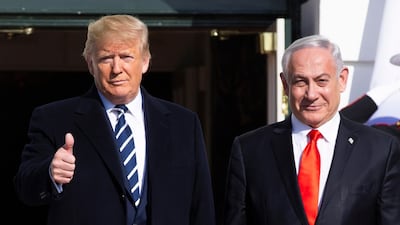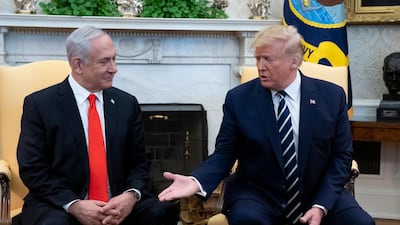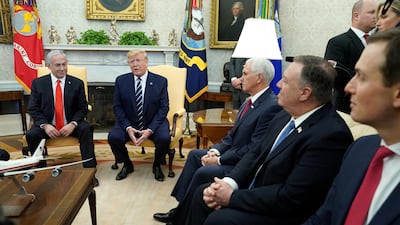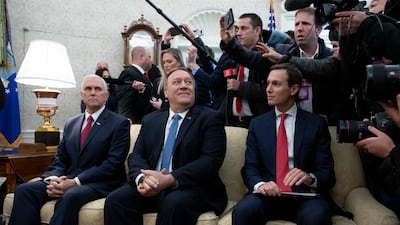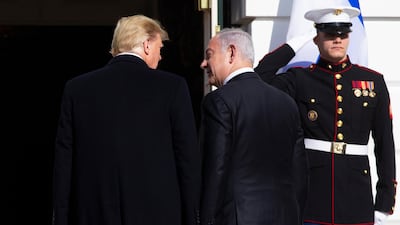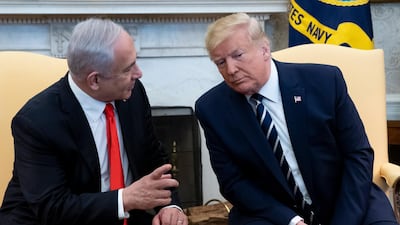US President Donald Trump announced that his long-awaited Palestinian-Israeli peace plan will be released on Tuesday, despite the Palestinians already rejecting the proposal.
Mr Trump called the plan a “big start” as he met Israeli Prime Minister Benjamin Netanyahu and his electoral rival Benny Gantz at the White House.
He said it was “a very big plan, a suggestion for peace between Israel and the Palestinians. It's the closest it's ever come and we'll see what happens".
He made his announcement alongside Mr Netanyahu at the White House, despite the Palestinians rejecting it ahead of its release and not being invited to Washington. He said it would be unveiled at midday local time.
Mr Trump said the Israeli Prime Minister and his rival Mr Gantz, who is also in Washington to meet the president before a March election, would be in favour of the plan's contents.
Mr Netanyahu called the political outline for a solution to the conflict, which is expected to be largely pro-Israel, the "opportunity of a century" and a chance to "make history". Mr Trump said the Palestinians would eventually accept the plan.
"They probably won't want it initially," he said. But I think in the end they will. It's very good for them. In fact it's overly good to them.
"So we'll see what happens. Now without them, we don't do the deal and that's OK. We think that there is a very good chance that they're going to want this."
The plan, also called the “deal of the century”, has been put together in the past two years by Mr Trump’s team.
They are his adviser and son-in-law Jared Kushner, his ambassador to Israel David Friedman, and special representative Avi Berkowitz, who took over Jason Greenblatt’s position.
Israeli press report that the plan is a 50-page document that includes a map of the final outcome.
Palestinian Prime Minister Mohammed Shtayyeh on Monday called on the world to reject the peace plan, saying that it “does not constitute a basis” for a political solution.
He told a Cabinet meeting that Mr Trump’s long-awaited political component of the plan was a bid to help him and Mr Netanyahu as they faced troubles at home.
"This is a plan to protect Trump from impeachment and protect Netanyahu from prison. It is not a Middle East peace plan," Mr Shtayyeh said.
"This plan gives Israel sovereignty over Palestinian territory."
On Tuesday, Mr Trump will deliver remarks with Mr Netanyahu at the White House to outline his plan, which is aimed at generating momentum towards resolving one of the world's most intractable problems.
It comes as Mr Trump is subject to an impeachment trial in the Senate while Mr Netanyahu, who has been indicted over corruption allegations, will contest an election against Mr Gantz next month.
"We call on the international community to not be partners in this because it contravenes international law," Mr Shtayyeh told the Palestinian Cabinet.
"The rights of the Palestinian people are not for sale."
The Palestinians have not been consulted on the political component of the deal, having cut all ties with the Trump administration over its pro-Israel stance.
The Trump administration has relocated the US embassy from Tel Aviv to West Jerusalem, effectively recognising the city as Israel’s capital. The Palestinians seek the city’s eastern sector to be the future capital of any sovereign state.
Only Guatemala followed in the US’s footsteps in moving its diplomatic mission to Jerusalem.
Alleged leaks of the plan, denied by Mr Trump, have suggested it could declare settlements in the occupied West Bank legal.
It is unclear if the plan will support Palestinian statehood, but The Jerusalem Post reported it is expected to include annexing all Israeli settlements to Israel, along with most of the Jordan Valley.
The US proposal could also withdraw from the creation of a Palestinian state with East Jerusalem as its capital after Mr Trump in 2018 recognised Jerusalem as Israel's capital.
The reaction of international powers could be key. The EU is likely to reaffirm its support for a two-state solution.
US Democrats have also expressed their opposition. Senator Bob Menendez and the chairman of the House committee on foreign affairs, Eliot Engel, on Monday released a statement criticising Mr Trump's approach to solving the conflict.
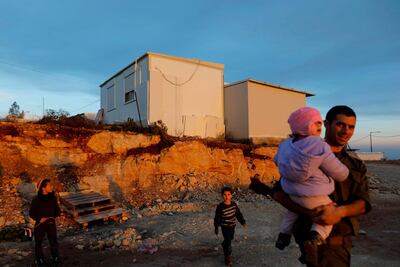
“The establishment of a Palestinian state would provide a home for millions of Palestinians," they said.
"The Palestinian people deserve the right to self-determination, and the United States should support this goal.
“A two-state solution cannot be born on the backs of unilateral actions from either side. Unilateral actions do not contribute to a sustainable peace and would not serve US interests.
"Unilateral steps would make it harder to come back to the negotiating table and could set unrealistic expectations and unachievable demands."
Mr Shtayyeh said Palestinian Authority President Mahmoud Abbas would call a meeting of the Palestinian leadership to discuss the best ways to respond to the plan.
In Gaza on Monday, a few hundred Palestinians protested against the Trump plan, which they ironically call the "Deal of the Century".
Mr Trump did not call the document a final outcome but said: “It is very important for peace in the Middle East.”
“We have to get others to to agree to it. Many of the Arab nations have agreed to it. They think it’s a big start. It’s a fantastic start.”
Arab governments have so far not commented on the document and there is no evidence to suggest they have seen it.
Robert Satloff, the executive director at the Washington Institute for Near East Policy, called the decision by Mr Trump to release the peace plan a departure from traditional American policy.
“It wasn’t the role of a US president to be a peace planner, but to create an environment by which Israelis and Palestinians can negotiate,” Mr Satloff said in a briefing on Monday.
The expert said the three components to the plan should be its objective, how to get there and a timetable.
But Khaled Elgindy, a senior fellow at the Middle East Institute, decried the idea of not including the Palestinians in the process. “The notion that an American president, in consultation with two Israeli leaders, could decide on the future of Palestinians without any Palestinian involvement seems to epitomise Mr Trump’s overall approach to the conflict – to hold the very notion of Palestinian agency in contempt,” Mr Elgindy wrote.
He called the approach “misguided and bizarre”, and one that would “fundamentally redefine the basic terms of an Israeli-Palestinian settlement by effectively doing away with the possibility of a two-state solution".
______________
